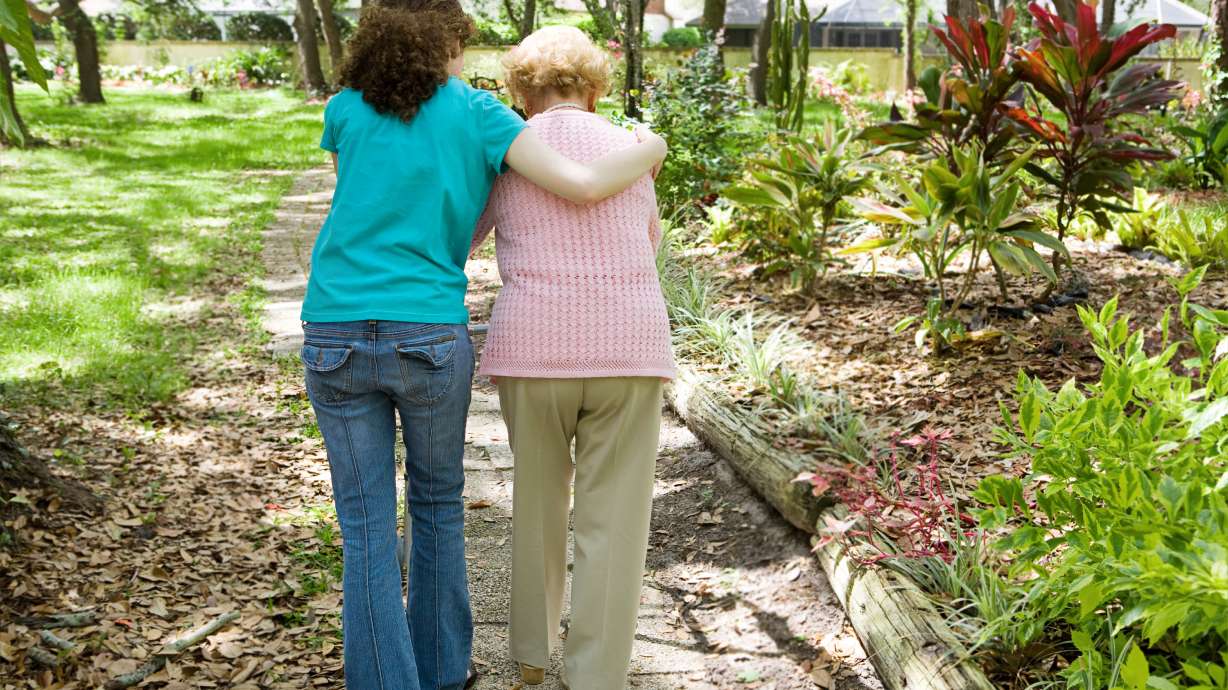Estimated read time: 3-4 minutes
This archived news story is available only for your personal, non-commercial use. Information in the story may be outdated or superseded by additional information. Reading or replaying the story in its archived form does not constitute a republication of the story.
- The VA Caregiver Support Program assists military veteran caregivers with resources and support.
- The program offers comprehensive and general formats, including virtual workshops and conferences.
- Participants report improved caregiving experiences, though many face work discrimination and financial challenges.
SALT LAKE CITY — Being a caregiver for a military veteran is a whole lot easier with the local Caregiver Support Program provided by Veterans Affairs.
The support program was started by the United States Department of Veterans Affairs in 2011 to provide caregivers of veterans not only with answers to questions regarding care but also engage them in classes to better support themselves and their vets. There are also virtual workshops and occasional conferences to help them take time for themselves, which is tough for full-time caregivers.
Heidi Hill, who has participated in the program for more than a decade, is amazed at all the VA staff does. As the primary caregiver of her husband, Layne Hill, she says she's amazed at how quick the VA staff is to do the things it would take her much more time to do — change medical stays, find a family member to help and ensure the well-being of patients and the caregivers.
"They're not just there doing a job. They genuinely care, and that's great," Hill said. "I don't know anything else in the community this organized. They are incredible. The program is really dynamic."
The Caregiver Support Program is divided into two formats that meet the needs of different groups of people. A comprehensive program focuses on veterans in need of a higher level of mental or physical care. The veterans must be clients of the VA health care system, must be designated with at least a 70% VA disability rating and must have at least six months of in-person care.
The other format, called the general program, is for those who are caregivers of VA patients with a desire to participate in the program.
In 2011, the program was intended to focus on World War II veterans and their family caregivers. Now, veterans from all conflicts can participate locally, as long as they live in Utah and the areas of surrounding states where the Salt Lake VA is closer than another in-state option. The coverage area is roughly 325,000 square miles.
With both formats, veterans and family caregivers must agree that the caregiver should join. As program coordinator Andrew Wittwer said, oftentimes, veterans are encouraged by caregivers to gain access to this program, noting "(the caregiver) does so much work. They need this."
Also, thanks to the pandemic, the VA staff has become well-versed in virtual meetings, allowing the number of caregiver participants to grow to 560 from just one in 2011.
The local program is here, as Hill describes it, as a way to get help with things when it is needed. You are not alone, and that is the point, she said.
"Sometimes, we'll call someone to check in on them, and they'll start to cry ... they'll say, 'Do you know how long it's been since somebody asked me if I'm OK?'" said Wittwer. "When we let them know about the program, the first response is quiet ... then the last is 'I'm so grateful.'"
Less than half of the folks who are family caregivers for a veteran get accommodations or any changes in a schedule at work. More than 25% feel they are discriminated against at work because of the demands their caregiving role puts on their time.
According to studies performed by the Elizabeth Dole Foundation and the RAND Foundation, between 50% and 70% of family caregivers for veterans say they have a hard time paying their bills.
The Caregiver Support Program may not solve all of the complicated issues, but the staff will provide resources to help. They have an open-door policy and believe caregivers are doing the best they can. As such, they should get a little help themselves every once in a while.
"I think the VA sees this program as pretty sacred," said Jay Frost, manager of the Salt Lake VA Caregiver Support Program. "We can't measure this, but the level of gratitude is pretty powerful.
"Rosalynn Carter's quote — 'There are only four kinds of people in the world: those who have been caregivers, those who are currently caregivers, those who will be caregivers and those who will need caregivers' – this is real for all of us," he said.
For more information about the VA Caregiver Support Program:
Visit caregiver.va.gov/
Applications for the comprehensive program are on the webpage.
For the general program, contact Andrew Wittwer by calling 801-582-1565, ext. 2608.









